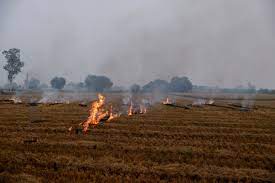
Farmers in the northern Indian states of Punjab and Haryana have adopted a new tactic to evade detection while burning crop residue, contributing to air pollution in the Delhi National Capital Region (NCR). Reports suggest that they are setting fields ablaze under the cover of darkness to avoid scrutiny by both satellites and local officials working to combat the hazardous farm fires.
Official data indicates a reduction in farm fire incidents compared to the same period last year. However, these figures appear inconsistent with the scale of paddy cultivation and the actual number of incidents reported. For instance, while over 56,000 farmers in Punjab’s Ludhiana harvested paddy, less than a thousand farm fires were officially reported, raising suspicions of underreporting.
One plausible explanation for this discrepancy is the timing of data updates. The daily count of farm fires needs to be updated by 8 pm, and some farmers seem to exploit this window by setting fires after this cutoff time.
In Haryana, the Haryana Space Applications Centre relies on satellite imaging to detect farm fires. However, this imaging is not conducted continuously; it occurs at 12-hour intervals, leaving room for some fires to remain undetected.
Some farmers in Haryana have adopted the belief that burning crop residue after sunset may help them escape satellite detection. They argue that satellite imaging relies on temperature changes for identifying farm fires, and the drop in temperature during the night could hinder the satellite’s ability to spot the fires. However, experts refute this claim, stating that satellite technology is capable of detecting fires regardless of the time of day.
The issue of undetected farm fires has broader implications, as government authorities use this data to formulate strategies to combat air pollution. The air quality situation in Delhi remains dire, with the air quality index consistently in the “severe” category. As a result, the Supreme Court has called on the governments of Delhi, Punjab, Haryana, Uttar Pradesh, and Rajasthan to collaborate with the central government to address the farm fires issue urgently.
The court stressed that the choking air quality is responsible for the “murder of people’s health” and emphasized the need to prioritize public health over political battles regarding air pollution sources. The ongoing efforts to combat air pollution in the region will likely face new challenges posed by the changing tactics of farmers.
Sources By Agencies




